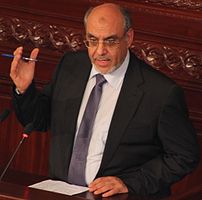
Presidential elections were held in Tunisia on 23 November 2014, a month after parliamentary elections. They were the first free and fair presidential elections since the country gained independence in 1956, and the first direct presidential elections after the Tunisian Revolution of 2011 and the adoption of a new Constitution in January 2014.

The Democratic Forum for Labour and Liberties, also referred to as Ettakatol or by its French acronym FDTL, is a social democratic political party in Tunisia. It was founded on 9 April 1994 and officially recognized on 25 October 2002. Its founder and Secretary-General is the radiologist Mustapha Ben Jafar.

Mohamed Moncef Marzouki is a Tunisian politician who was an interim president of Tunisia from 2011 to 2014. Through his career he has been a human rights activist, physician and politician. On 12 December 2011, he was chosen as Interim President of Tunisia by the Constituent Assembly.

The Ennahda Movement, also known as the Renaissance Party or simply known as Ennahda, is a self-defined Islamic democratic political party in Tunisia.

Mohamed Beji Caid Essebsi was a Tunisian statesman who was the president of Tunisia from 31 December 2014 until his death on 25 July 2019. Previously, he served as the minister of Foreign Affairs from 1981 to 1986 and as the prime minister from February 2011 to December 2011.

The Constituent Assembly of Tunisia, or National Constituent Assembly (NCA) was the body in charge of devising a new Tunisian constitution for the era after the fall of President Zine El Abidine Ben Ali and his Constitutional Democratic Rally (RCD)–regime. Convoked after the election on 23 October 2011, the convention consists of 217 lawmakers representing Tunisians living both in the country and abroad. A plurality of members comes from the moderate Islamist Ennahda Movement. The Assembly held its first meeting on 22 November 2011, and was dissolved and replaced by the Assembly of the Representatives of the People on 26 October 2014.

Hamadi Jebali is a Tunisian engineer, Muslim politician and journalist who was Prime Minister of Tunisia from December 2011 to March 2013. He was the Secretary-General of the Ennahda Movement, a moderate Islamic party in Tunisia, until he left his party in December 2014 in the course of the 2014 Tunisian presidential election.

Rafik Bouchlaka is a Tunisian politician. He served as the minister of foreign affairs under Prime Minister Hamadi Jebali.

Noureddine Bhiri is a Tunisian politician. He served as the Minister of Justice under Prime Minister Hamadi Jebali.

Ali Laarayedh is a Tunisian politician who was Prime Minister of Tunisia from 2013 to 2014. Previously he served in the government as the Minister of the Interior from 2011 to 2013. Following the resignation of Prime Minister Hamadi Jebali, Laarayedh was designated as Prime Minister in February 2013. He is a member of the Ennahda Movement.
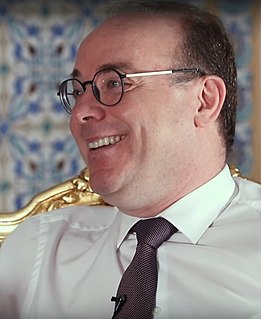
Elyes Fakhfakh is a Tunisian politician. He served as the Minister of Tourism and, starting on 19 of December 2012, as the Minister of Finances as well, under Prime Minister Hamadi Jebali. He served as the Prime Minister of Tunisia from 27 February to 2 September 2020.

Abdelwaheb Maatar is a Tunisian politician. He serves as the Minister of Training and Employment under Prime Minister Hamadi Jebali.

Abderrahman Ladgham is a Tunisian politician. He serves as the Deputy Prime Minister for Governance & Combating Corruption under Prime Minister Hamadi Jebali.

Abderrazak Kilani is a Tunisian politician and lawyer. In 2010 and during the Tunisian Revolution, he was the chairman of the National Bar of Lawyers In 2012, he served as the Deputy Prime Minister for Relations With the Constituent Assembly under Prime Minister Hamadi Jebali. Since 2013, he has been Ambassador of Tunisia to the United Nations. In October 20, 2020, Prime Minister Hichem Mechichi decided to appoint Abderrazak Kilani as President of the General Authority of Resisters, Martyrs and Wounded of the Revolution and Terrorist Operations, a Prime Ministry press release announces.
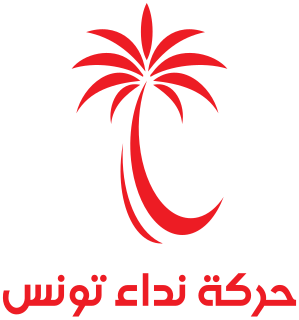
Nidaa Tounes is a big tent secularist political party in Tunisia. After being founded in 2012, the party won a plurality of seats in the October 2014 parliamentary election. The party's founding leader Beji Caid Essebsi was elected President of Tunisia in the 2014 presidential election.
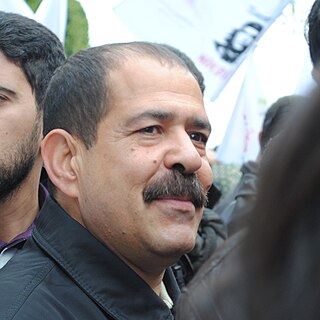
Chokri Belaïd, also transliterated as Shokri Belaïd, was a Tunisian politician and lawyer who was an opposition leader with the left-secular Democratic Patriots' Movement. Belaïd was a vocal critic of the Ben Ali regime prior to the 2011 Tunisian revolution and of the then Islamist-led Tunisian government. On 6 February 2013, he was fatally shot outside his house in El Menzah, close to the Tunisian capital, Tunis. As a result of his assassination, Tunisian Prime Minister Hamadi Jebali announced his plan to dissolve the existing national government and to form a temporary "national unity" government.
A political crisis evolved in Tunisia following the assassination of leftist leader Mohamed Brahmi in late July 2013, during which the country's mainly secular opposition organized several protests against the ruling Troika alliance that was dominated by Rashid al-Ghannushi's Islamist Ennahda Movement. The events came as part of the aftermath of the Tunisian Revolution which ousted the country's longtime president Zine El Abidine Ben Ali, followed by a general election which saw Ennahda win a plurality alongside Moncef Marzouki's allied Congress for the Republic (CPR). The crisis gradually subsided when Prime Minister Ali Laarayedh resigned and a new constitution was adopted in January 2014.

Parliamentary elections were held in Tunisia on 26 October 2014. Campaigning started on 4 October 2014. They were the first free regular legislative elections since independence in 1956, and the first elections held following the adoption of the new constitution in January 2014, which created a 217-seat Assembly of the Representatives of the People. According to preliminary results, Nidaa Tounes gained a plurality of votes, winning 85 seats in the 217-seat parliament, beating the Ennahda Movement and many smaller parties.
The following lists events that happened during 2013 in the Tunisian Republic.
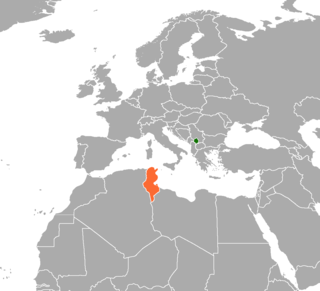
Kosovar–Tunisian relations are foreign relations between Kosovo and Tunisia. Formal diplomatic relations between the two states are non-existent as Tunisia does not recognize Kosovo as a sovereign state.
